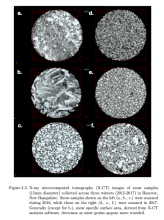Jake Carlson
Posts tagged with love your data week in Blog Bits and Pieces
Showing 1 - 9 of 9 items
In this interview, Yingxiao Zhang (PhD candidate in the Climate and Space Sciences department) describes why she decided to share the data set entitled "Simulated historical (1995-2014) and future (2081-2100) pollen emission using PECM2.0" in Deep Blue Data.

In this interview, Dr. Adam Schneider (U-M alum; PhD in Atmospheric, Oceanic and Space Sciences 2018) described why he decided to share the data set entitled "Supporting data for the Near-Infrared Emitting and Reflectance-Monitoring Dome" in Deep Blue Data.

In this interview, Nate Clemett (Master's student in the naval architecture and marine engineering department) describes his research and why he decided to share his data set entitled "Flywheel Energy Storage System Roll Dataset" in Deep Blue Data.

In this interview, Dr. Wilkinson Daniel Wong Gonzales (U-M alum; PhD in Linguistics 2022) describes why he decided to share the data set entitled "The Lannang Corpus (LanCorp): A POS-tagged, sociolinguistic corpus containing recordings and transcriptions of Lannang speech collected from the metropolitan Manila Lannangs between 2016 and 2020" in Deep Blue Data.

You probably know that the University of Michigan Library offers a variety of educational programs, but did you know that these programs include topics relevant to working with research data?

It is common scholarly practice to publish results of research, and it is becoming increasingly more important to share the underlying data. Data sharing allows for the replicability and verification of experimental findings and allow for reuse in new and unexpected ways. Sharing your data may also increase the impact of your research.

Documenting your data is kind of like eating your spinach. You know that you need to do it to keep your data healthy, but it’s not something that you look forward to. Good documentation takes an investment of time and energy. It can feel like grunt work, or that it is slowing you down when you really want to keep making progress on your research.

The Oxford English Dictionary defines organized as: “Of a person: having one's affairs in order so as to be able to deal with them efficiently.”
When you spend the best hours of your day doing research and working with data, it makes sense to be organized so you can use your time as efficiently as possible. One of the methods for maintaining an organized research life is by developing a data management plan (DMP).
When you spend the best hours of your day doing research and working with data, it makes sense to be organized so you can use your time as efficiently as possible. One of the methods for maintaining an organized research life is by developing a data management plan (DMP).

Welcome to our series of Love Your Data Week posts! Each day this week, in connection with the Love Your Data campaign on social media, a UM librarian will be blogging about a different data-related topic, sharing personal anecdotes and tips that you can use to improve your own research data practices. To kick things off, we're writing today about data safety.